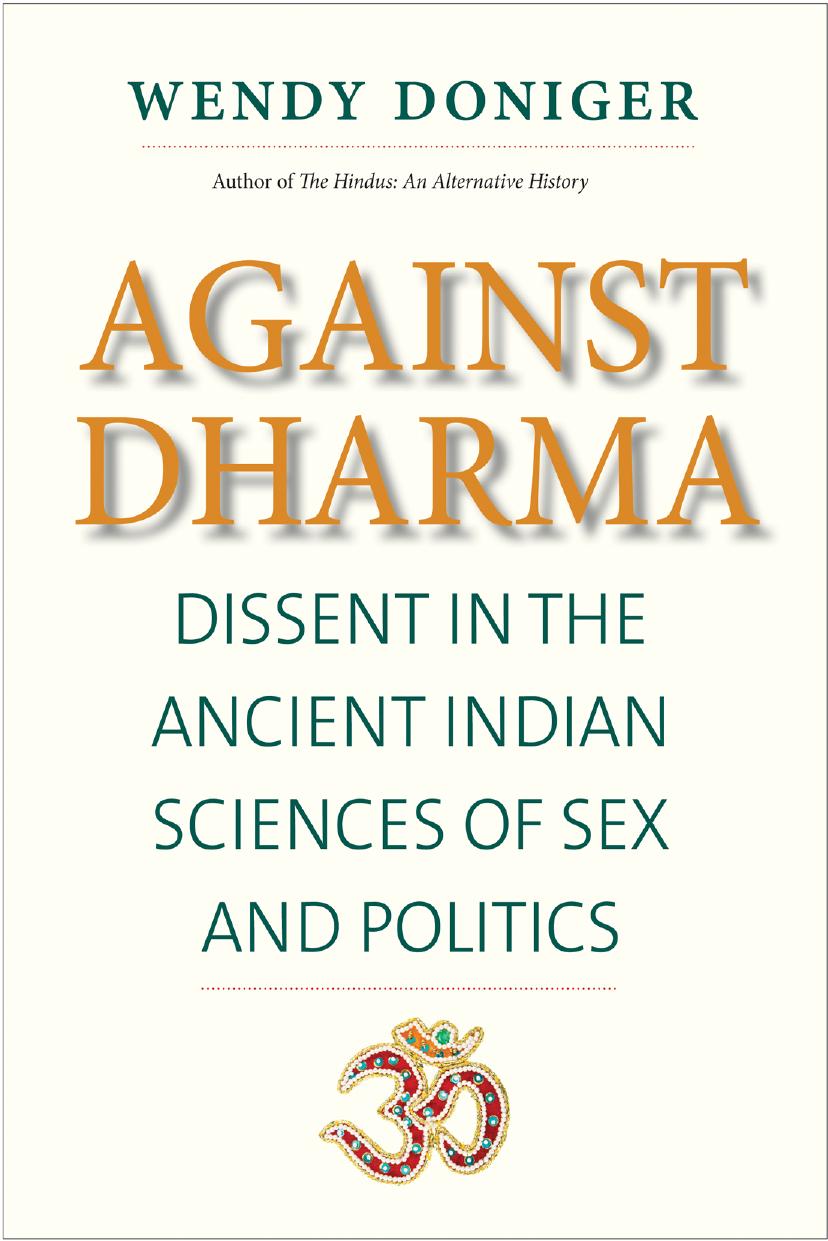Against Dharma by Wendy Doniger

Author:Wendy Doniger [Doniger, Wendy]
Language: eng
Format: epub, pdf
ISBN: 9780300216196
Publisher: Yale University Press
Published: 2017-01-15T07:00:00+00:00
6
Skepticism and Materialism in Ancient India
Who Were the Lokayatikas and the Charvakas?
I have argued that the Kamasutra and the Arthashastra often deviated significantly from dharma in ways that amounted to a covert attack. Now I want to argue that this attack was continued in a most ingenious and devious way by the creation of a mythology about wicked skeptics or materialists whose words were always cited with shock and disapproval but always cited, always kept alive.
The Lokayatikas and the Charvakas, materialists and skeptics, are the heirs of the Arthashastra and the Kamasutra, at least to the extent that the idea of doing whatever you need to do to get what you want (in the Arthashastra) and having as much fun as you possibly can (in the Kamasutra), with no regard for dharma in either case, was fuel for the Lokayatika/Charvaka legend. The texts attributed to Lokayatikas (or, later, Charvakas) carry on the materialist and skeptical legacy of the scientific shastras, sniping away at dharma. We can identify places where the Kamasutra and the Arthashastra are skeptical, and then trace such views as they are attributed to the Lokayatikas and the Charvakas. Thus resistance to the dharmic party line continued to be present in ancient and medieval India, producing numerous fissures in the smooth surface of the conventional theocracy. The Arthashastra praises the Lokayatikas and the Kamasutra criticizes them, but both texts show a striking congruence with the adharmic sentiments that many texts of the period (including the Kamasutra) often pejoratively attributed to the Lokayatikas.
The Sanskrit word Lokayata is derived from loka, “world” or “people,” and Lokayata (literally, “spread [ayata] throughout the world/people”) therefore can be translated as “worldliness” or “[the opinion] of the people.” Lokayata is, properly, the doctrine; those who subscribe to it are Lokayatikas.1 The thirteenth-century commentator on the Kamasutra (1.2.21) says that Lokayatikas are people whose thinking is limited (ayata) to this world (loka). Another suggestion derives Laukayatika from ayati, meaning “the time to come,” the future, so that the Lokayatikas are those for whom this world (loka) is the (only) future (ayati).2 Charvakas can mean “Sweet-Talkers” (from charu [“sweet”] and vaka [“speaking”]), but they are also sometimes said to be followers of a philosopher named Charvaka. The verb char means “to move about” but also “to get around” (that is, “to be promiscuous”)3 and “to be tricky or slippery with words.” To further complicate the issue, sometimes the Lokayatikas or the Charvakas were called “Barhaspatyas,” from the allegedly lost (and much-cited) text called the “Sutra of Brihaspati,”4 attributed to Brihaspati. This Brihaspati could have been either the mythical, conniving chief counselor of the king of the gods or a human person whom the Kamasutra regards as the original author of the Arthashastra. According to the Mahabharata, Brihaspati invented the adharmic Lokayatra [sic] doctrine.5
Lokayata and Lokayatikas in the Arthashastra and the Kamasutra
Centuries after their own time, the Arthashastra and the Kamasutra were widely regarded as having an extensive and striking congruence with Lokayata and Charvaka doctrines. A
Download
This site does not store any files on its server. We only index and link to content provided by other sites. Please contact the content providers to delete copyright contents if any and email us, we'll remove relevant links or contents immediately.
| Confucianism | Feng Shui |
| I Ching | Jainism |
| Karma | Shintoism |
| Sikhism | Tao Te Ching |
| Taoism | Tibetan Book of the Dead |
| Zoroastrianism |
The Tao of Physics by Fritjof Capra(2266)
Human Design by Chetan Parkyn(2066)
The Diamond Cutter by Geshe Michael Roach(2058)
Feng Shui by Stephen Skinner(1936)
The Alchemy of Sexual Energy by Mantak Chia(1848)
Tao Te Ching by Lao Tzu(1833)
365 Tao: Daily Meditations by Ming-Dao Deng(1607)
Tao Tantric Arts for Women by Minke de Vos(1574)
Sun Tzu's The Art of War by Giles Lionel Minford John Tzu Sun(1531)
Sidney Sheldon (1982) Master Of The Game by Sidney Sheldon(1511)
Buddhism 101 by Arnie Kozak(1503)
Karma-Yoga and Bhakti-Yoga by Swami Vivekananda(1487)
The Analects of Confucius by Burton Watson(1420)
The Art of War Other Classics of Eastern Philosophy by Sun Tzu Lao-Tzu Confucius Mencius(1407)
Tao te ching by Lao Tzu(1355)
The Way of Chuang Tzu by Thomas Merton(1342)
The New Bohemians Handbook by Justina Blakeney(1340)
The Sayings Of by Confucius(1301)
Bless This House by Donna Henes(1263)
